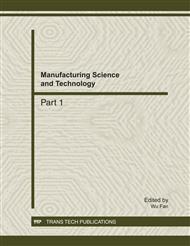[1]
H. W Dommel, W. F Tinney, Optimal Power Flow Solutions, IEEE-PAS, Vo1. 87, No. 10, pp.1866-1876, October (1968).
DOI: 10.1109/tpas.1968.292150
Google Scholar
[2]
Zhu Luo, Optimal Control of Voltage and Reactive Power in Systems, Automation of Electric Power Systems, Vol. 12, No. 1, pp.9-15, (1988).
Google Scholar
[3]
D. I Sun, B Ashley, B Brewer, A Hughes, W. F Tinney, Optimal Power Flow by Newton Approach, IEEE-PAS, Vol. 103, No. 10, October (1984).
DOI: 10.1109/tpas.1984.318284
Google Scholar
[4]
Haozhong Cheng, Hao Wu, Reactive Power and Stability of Voltage in Power System, Beijing: China Electric Power Press, (2004).
Google Scholar
[5]
Mingbo Liu, S. K Tao, An Extended Nonlinear Primal-dual Interior Point Algorithm for Reactive Power Optimization of Large-scale Power Systems with Discrete Control Variables, IEEE Trans on Power Systems, Vol. 17, No. 4, pp.982-991, (2002).
DOI: 10.1109/tpwrs.2002.804922
Google Scholar
[6]
Yongjun Zhang, Zhen Ren, Real-time optimal reactive power dispatch using multi-agent technique, Electric Power Systems Research, Vol. 69, No. 3, pp.259-265. (2004).
DOI: 10.1016/j.epsr.2003.10.009
Google Scholar
[7]
W. S Jwo, C. W Liu, C. C Liu, Y. T Hsiao, Hybrid expert system and simulated annealing approach to optimal reactive power planning, IEE Proceedings-GTD, Vol. 142, No. 4, pp.381-385, (1995).
DOI: 10.1049/ip-gtd:19951958
Google Scholar
[8]
Zhaohua Lin, Yunhe Hou, Xinyin Xiong, Lujuan Lu, Generalized ant colony optimization algorithm for reactive power optimization in power systems, Journal of North China Electric Power University, Vo1. 30, No. 2, pp.6-9, Mar (2003).
Google Scholar
[9]
Renjun Zhou, Study on Improved Optimization Methods for Voltage Reactive Power Control, PhD Thesis of Huazhong University of Science and Technology, (2005).
Google Scholar
[10]
Xinyin Xiong, Yaowu Wu, Genetic Algorithms & Its Application in Power Systems, Wuhan : Huazhong University of Science and Technology Press , (2002).
Google Scholar
[11]
Kennedy J, Eberhart R, Particle Swarm Optimization, Proceedings of IEEE International Conference on Neural Networks, Piscataway: IEEE Service Center, 1995, p.1942-(1948).
Google Scholar
[12]
Hong He, Feng Qian, Du Wenli, A chaotic immune algorithm with fuzzy adaptive parameters, Asia-Pacific Journal of Chemical Engineering, vol. 3, no. 6. pp.695-705, (2008).
DOI: 10.1002/apj.204
Google Scholar
[13]
Y Shi, R. C Eberhart, A modified particle swarm optimizer, Proceedings of IEEE International Conference on Evolutionary Computation, Anchorage, 1998, 69-73.
DOI: 10.1109/icec.1998.699146
Google Scholar
[14]
Yongjun Zhang, Cataclysmic Genetic Algorithm and MAS Based Model for Reactive Power Optimization of Power Systems, PhD Thesis of South China University of Technology, (2004).
Google Scholar


